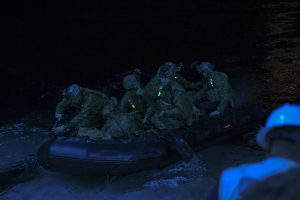Taiwan’s Naval Command has confirmed that a team from the Marine Raiders Regiment – the U.S. Marine Corps’ special operations forces – arrived in the country on November 9 to train the Taiwanese Marines, the first such official contact between the two since 1979 when the United States formally recognized the People’s Republic of China. Taiwan News, quoting the UDN, reported that during their month-long visit the Raiders will train the Taiwanese Marines “in assault boat and speedboat infiltration operations at the Tsoying Naval Base in Kaohsiung.”
Taiwanese special forces and the U.S. Army Green Berets hold annual joint exercises, the report also noted.
The very public move of Taiwan in welcoming U.S. marines comes amid growing international apprehension since the summer that China may be planning an invasion of Taiwan some point in the near future. Reports over the past few months have noted an increase in tempo of People’s Liberation Army (PLA) live-fire exercises near Taiwan in the Yellow Sea, the East China Sea, and South China Sea involving air defense missiles and anti-aircraft artillery. In response, the Trump administration in the United States has approved the sale of an array of weapon systems to Taipei, including ones that stretch the definition of “defensive arms” which is all that the U.S. is technically permitted to provide Taiwan following the 1979 Taiwan Relations Act. Obtaining weapons such as stand-off land attack missiles from the U.S. will allow Taiwan to strike China across the strait.
Taiwan’s defense strategy – the Overall Defense Concept (ODC) – is defensive by nature, and rests on exploiting asymmetrical advantages in face of a full-scale Chinese invasion. As the concept’s developer Admiral Lee Hsi-min (retd.) recently put it in a co-authored article in these pages, the ODC concept of operations imagines three pillars to Taiwan’s defense: force protection; decisive battle in the littoral zone; and destruction of the enemy at the landing beach.
As Brendan Taylor described a scenario of full-scale invasion of Taiwan in a 2018 book, the PLA will most likely start with first securing Taiwan’s many offshore islands so that the Taiwanese armed forces can’t use them to target Chinese bases and ports. In Taylor’s scenario, having secured them, the PLA will then move on to the main island and upon capturing docks and harbors, launch a tank battle as its moves inland. In this scenario, the Taiwanese marines would prove to be key for Taiwan’s defense, by forming the first line of effort in retaking offshore islands that may fallen into the hands of the PLA or even sabotaging Chinese facilities across the strait. Taiwan carried out anti-landing operations on one of its offshore islands in September.
Beyond this, if the Taiwanese marines manage to stage small-scale amphibious operations across the strait to infiltrate and neutralize attack key Chinese air defense facilities, Taiwan’s land attack missiles and air assets, manned and unmanned, will then come in play to enforce intra-conflict deterrence. One can imagine similar roles for the Taiwanese marines in disrupting PLA logistics and communications nodes.
Finally, of course there is the possibility of the U.S. Marine Raiders being deployed for similar cross-strait roles, especially in a scenario where the U.S. is hesitant to risk naval assets, including flattops, in face of China’s denial capabilities at the onset of the conflict. Whatever be the case, amphibious special forces have a major role in Taiwan’s asymmetrical defense strategy and allied support for it.
To end on a curious historical note: The Marine Raiders had played a key role in the Pacific campaign in World War II, and the Marine Special Operations Command’s appropriation of that moniker for all units under it in 2014 had been somewhat controversial. U.S. Marine Corps Major Evans Carlson — along with Colonel William “Wild Bill” Donovan, the chief of the Office of Strategic Services, the precursor to the Central Intelligence Agency – is seen as one of the fathers of the Raiders. Interestingly enough, Carlson some apparently espoused lessons he had learnt from his association with communist guerrillas Mao Zedong and Zhou Enlai.

































